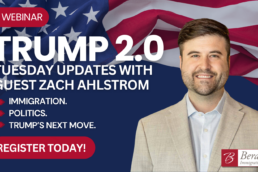If you or a loved one are planning to apply for a U.S. visa this year, it’s time to listen up. The U.S. Department of State (DOS) has announced a massive policy change that will impact nearly everyone, regardless of age, visa type, or previous history with the consulate.
Whether you’re a parent applying for a newborn, a student renewing a visa, or a seasoned traveler who’s always qualified for an interview waiver, this new rule will likely apply to you.
New Visa Interview Requirement Starts September 2, 2025
Starting September 2, 2025, almost all nonimmigrant visa applicants will be required to attend an in-person visa interview at a U.S. consulate abroad. That list now includes:
- babies and toddlers;
- elderly individuals; and
- applicants who previously qualified for an interview waiver.
This marks a dramatic departure from the pandemic-era interview flexibility we’ve seen in recent years.
Who Is Exempt From This New Rule?
There is only a short and specific list of applicants who are excluded from the new requirement. If you fall into one of the two categories below, you may still qualify for an interview waiver:
- Diplomatic and official visas, including A, G, NATO, and TECRO E-1 categories
- Limited B-1/B-2 renewals, but only if:
- You were 18 or older at the time of your prior visa issuance
- You’re renewing a full-validity visa that expired within the last 12 months
Even if you meet these requirements, waivers are not necessarily guaranteed. Consulates still have the power of discretion to require an interview for any single applicant.
Why Is This Happening? (Spoiler: It’s Not About Security)
This isn’t the first time we’ve seen a rollback on interview waivers in 2025. Back in May, Mission China implemented a policy requiring interviews for all visa applicants under the age of 79. This move set a clear precedent for what was coming, and now we have a full-scale implementation across global consulates.
The reason? Officially, it’s vague. Unofficially, it’s clear: this isn’t about enhancing national security. If that were the goal, the administration would be backing it with data or intelligence justifying the shift. But that’s not happening.
What’s really going on? Visa issuance is slowing way down.
This policy gives the DOS and U.S. consulates more control over visa volume, adds friction to the process, and allows for increased scrutiny. In other words, it’s a bureaucratic lever, not a security upgrade.
What This Means for Visa Applicants
For most travelers, this change is going to mean more waiting, more paperwork, and more headaches. Here’s what we expect to see over the coming months:
- Significantly longer wait times for visa interviews, especially in high-demand consulates.
- Increased risk of visa denials, especially for anyone who is unprepared or applying without legal guidance.
- Delays in administrative processing, which can stretch from weeks to months.
- Family separations due to delayed travel.
- Workers, students, and visitors stuck abroad, missing deadlines and obligations.
- Increased stress on already short-staffed consular officers, leading to further bottlenecks.
Let’s be blunt: This policy adds complexity and uncertainty at every step.
How Can You Prepare for the New Visa Interview Rules?
While the change is frustrating, it’s not a complete roadblock. The key is to stay informed and get proactive. Use these three steps to protect yourself and your loved ones from unnecessary delays:
- Plan Ahead
If you’re eligible for an interview waiver right now, and have an appointment scheduled before September 2, you may still be processed under the old rules. But don’t assume! Interview waivers are never guaranteed, and consulates can always request an in-person appointment at their discretion…even now.
If you’re planning a future trip, start early. Consider pushing your application forward before the deadline, if possible. - Stay Informed
Immigration policy doesn’t change in a vacuum, and it rarely changes slowly. These types of updates roll out with little warning, and implementation can vary by country, region, or even consulate. Always check with the official consulate website where you intend to apply, and monitor announcements from the Department of State.
Don’t rely on social media rumors or outdated information. U.S. immigration policy is complex and rapidly evolving. Misinformation can cost you time, money, or even your visa. - Work With an Experienced Immigration Attorney
This is not the time for a do-it-yourself approach. A seasoned immigration lawyer can:
- Help determine whether you’re exempt from the new interview requirement
- Prepare you thoroughly for an in-person interview, if needed
- Ensure your application is accurate, complete, and properly supported
- Assist with responding to consular requests, administrative processing delays, or denials
- Provide peace of mind in a stressful process
Immigration law is high stakes and high stress. Working with a trusted professional can save you a mountain of hassle, and give you the best shot at success.
Need Help With Your U.S. Visa Application?
At Berardi Immigration Law, we’ve helped thousands of clients successfully navigate visa applications, consular interviews, and complex policy changes like this one. Whether you’re applying for a work visa, student visa, family-based visa, or looking to become a U.S. citizen, our experienced team is ready to help.
Don’t let this new rule, or any other form of bureaucracy, derail your plans. Book a consultation today. We’ll walk you through your options, identify any risks, and develop a custom immigration strategy tailored to your goals.
Related Posts
February 12, 2026
Understanding B-1 Business Visitor Status: What You Can and Can’t Do
February 10, 2026
Webinar: “Trump 2.0: Tuesday Updates With Guest Zach Ahlstrom”
Ready to have Berardi on your side?
Whether you’re a business looking to hire or a professional hoping to relocate, immigration law can be complicated. But you don’t have to do it alone. Put our experience to work for you.



